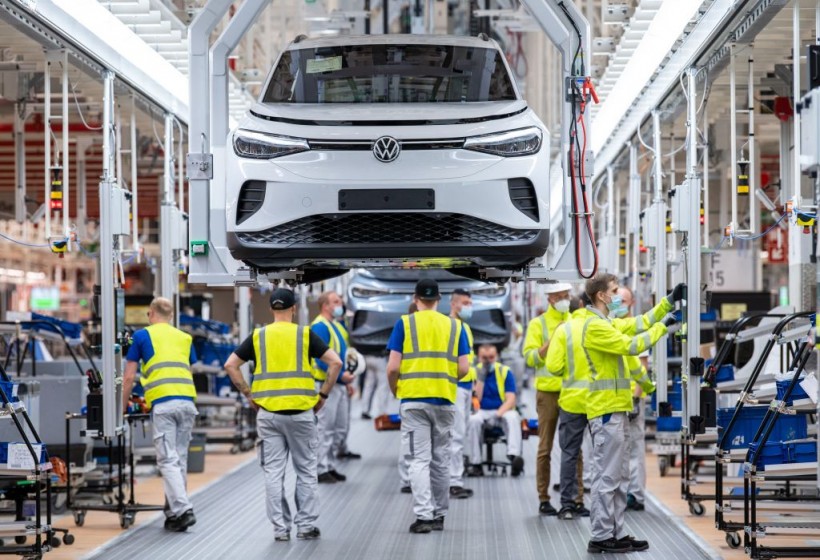The European Commission is deliberating on the imposition of punitive tariffs for safeguarding EU automakers from the influx of lower-priced Chinese electric vehicle (EV) imports, which, according to the Commission, benefit from substantial state subsidies.
According to TechCrunch, European Commission President Ursula von der Leyen, in her annual address to the EU's parliament on Wednesday, pointed out the oversaturation of global markets with cost-effective electric cars.
She underscored that extensive state subsidies artificially sustain their affordability. At present, the standard EU tariff for cars stands at 10%.
Over the next 13 months, the Commission will determine whether to implement tariffs exceeding that rate. Such a move might provoke a trade dispute with China.

Employees work at the assembly line for the Volkswagen (VW) ID 4 electric car of German carmaker Volkswagen, in the production site of Emden, northern Germany on May 20, 2022.
European Commission Anti-Subsidy Probe Encompasses Chinese Brands
This anti-subsidy inquiry encompasses not only Chinese brands but also non-Chinese entities that manufacture in China, including Tesla, Renault, and BMW.
This inquiry on Chinese EV firms in Europe closely follows the IAA Mobility 2023 conference held in Munich. Chinese EV manufacturers, ranging from industry giants like BYD to startups like XPeng, significantly amplified their presence at the event, effectively doubling their representation from the previous year.
The organizers reported that approximately 41% of the presenters were from Asia. During the event, European automakers made concerted efforts to showcase economically viable, cutting-edge electric vehicles in a bid to match the offerings of their Asian counterparts, TechCrunch reported.
Although they have yet to secure a significant foothold in the European market, Chinese automakers stand at the cusp of a transformative shift as they extend their operations beyond China.
As domestic consumer demand dwindles amid an economic slowdown and Tesla's competitive pricing strategies heighten local competition, Chinese EV manufacturers face escalating pressure to globalize their operations.
Reflecting on this trend, China's auto exports experienced a notable upswing of 31% in August, according to the China Passenger Car Association. Within the EU, the share of EVs originating from China - typically priced around 20% lower than their EU-manufactured counterparts has surged to 8%.
Read Also: No More Bidirectional Charging for EVs in California? State Assembly Shut Down Bill's Efforts
EU Wants to Reduce its Reliance on China
According to forecasts from the European Commission, this figure could potentially swell to 15% by 2025. Recent developments substantiate this outlook. XPeng, for instance, announced at IAA its plans to introduce the premium SUV, the G6, to the European market next year.
This addition will complement the models already retailing in Norway, Sweden, Denmark, and the Netherlands. Additionally, BYD unveiled a new series of cars tailored for the European market at the event.
In a prior announcement, Chinese EV maker Nio announced plans to introduce a new range of vehicles specifically tailored for the European market by 2024. These models will roll out from its newly established factory in China.
Objecting to the investigation, the Chinese Chamber of Commerce to the EU has asserted that China's competitive advantage does not arise primarily from subsidies but from other impartial factors.
Following in the footsteps of the US, the EU is striving to reduce its reliance on China, especially for critical materials and products essential for the shift towards electric mobility.
Related Article: BMW Finally Unveils an All-Electric MINI Cooper: Here's Everything You Need to Know










